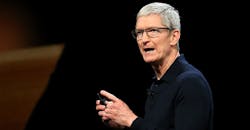Apple Attacks EU in Court Fight Over $14 Billion Tax Bill
Apple Inc. told a European Union court it was unfairly painted as a tax dodger as it sought to topple a massive EU back-tax bill that’s the hallmark of antitrust chief Margrethe Vestager’s five-year crackdown on U.S. tech giants.
The EU alleged that “Apple paid essentially no tax on earnings in Europe” and “sought headlines by quoting tiny numbers, but this public campaign ignores the taxes Apple pays all across the world,” Apple attorney Daniel Beard said at a hearing at the EU General Court in Luxembourg on Tuesday.
The iPhone maker said it’s the world’s biggest taxpayer, urging EU judges to overturn a 2016 order by the European Commission to hand over a record 13 billion euros ($14.3 billion) in unpaid taxes to Ireland. Apple, which made a reputation on smashing industry conventions, “follows the rules” and the EU was wrong to claim that profits should have been taxed in Ireland instead of the U.S. where Apple products are developed, according to Beard.
“Apple pays its taxes and understands the importance of doing so,” the lawyer said at the hearing where Apple executives, including Chief Financial Officer Luca Maestri, dropped their usual smart casual attire for formal suits. “In fact, we believe Apple is the largest taxpayer in the world.”
Apple’s haggling over tax comes after its market valuation hit $1.02 trillion last week on the back of a new aggressive pricing strategy that may stoke demand for some smartphones and watches. The company’s huge revenue -- and those of other technology firms -- have attracted close scrutiny in Europe, focusing on complicated company structures for transferring profits generated from intellectual property.
Ireland, in its parallel appeal of the EU decision, accused regulators of “unjust criticism” and coming up with “confused and inconsistent lines of reasoning in an attempt to justify” a desired conclusion.
“It is a serious overreach for the commission to override national law,” Paul Gallagher, a lawyer for Ireland, told the judges. “The commission did not identify a single instance where a taxpayer was treated less favorably than Apple.”
While the hearing lacks some of the box-office appeal of Monday’s Brexit meeting a few miles down the road between U.K. Prime Minister Boris Johnson and Luxembourg counterpart Xavier Bettel, it’s a blockbuster event for the EU’s courts, with dozens of lawyers and lobbyists crammed into a chamber that’s usually virtually empty.
The final ruling, likely to take months, could empower or halt Vestager’s tax probes, which are now centering on fiscal deals done by Amazon.com Inc. and Alphabet Inc. She’s also been tasked with coming up with a “fair European tax” by the end of 2020 if global efforts to reform digital taxation don’t make progress.
The commission rejected claims that it acted “as some sort of policeman of taxation” and said questions of “tax sovereignty are utterly irrelevant.”
“At no time” did Ireland “explain just what it does,” commission lawyer Richard Lyal told the court. Its initial 1991 tax deal with Apple involved “no real assessment” of how Apple should be taxed, when Irish officials “simply accepted an arbitrary method proposed by Apple Ireland subsidiaries.”
If Ireland “has no system, then its decisions must be based on pure discretion. And if those decisions were based on pure arbitrary discretion, they must be presumed to constitute aid” in the form of an illegal tax break, he said.
Apple’s fury at the EU’s 2016 order saw Chief Executive Officer Tim Cook blasting the EU move as “total political crap.” The company’s legal challenge claims the EU wrongly targeted profits that should be taxed in the U.S. and “retroactively changed the rules” on how global authorities calculate what’s owed to them.
The U.S. Treasury has weighed in too, saying the EU was making itself a “supra-national tax authority” that could threaten global tax reform efforts. President Donald Trump said Vestager “hates the United States” because “she’s suing all our companies.
The first hints of how the case may turn out will come from a pair of rulings scheduled for Sept. 24.
The General Court will rule on whether the EU was right to demand unpaid taxes from Starbucks Corp. and a Fiat Chrysler Automobiles NV unit. Those judgments could set an important precedent on how far the EU can question tax decisions national governments make on how companies should be treated.
By Stephanie Bodoni and Aoife White
About the Author
Bloomberg
Licensed content from Bloomberg, copyright 2016.
